Printable Version of Topic
Click here to view this topic in its original format
914World.com _ 914World Garage _ Oil Galley Plugs
Posted by: saigon71 Jan 18 2016, 01:49 PM
In preparation for an engine rebuild, I wanted to get myself up to speed on drilling/tapping the oil galley plugs.
Search revealed conflicting information about whether all should be removed and tapped or just the five big ones.
What's the current school of thought on this?
Also, what size plugs and drill/tap will I need.
Thanks!
http://www.914world.com/bbs2/index.php?showtopic=103988&hl=
Posted by: Porschef Jan 18 2016, 05:52 PM
Bob, I did mine as a precaution before installing the new engine. Just the five as shown in your link. Not a difficult job, but you need to be careful, I recall lots of grease on the drill bit and also a tape plug that I made up when tapping the holes.
I rented the tap from Chris Foley, and got the plugs from McMasterCarr. I don't recall the drill bit size, but I have it out in the garage. I'll hobble out tomorrow and check it out.
Overall, it just gave me peace of mind. One of the plugs began to spin when I drilled the initial hole to pull it out, the others were probably fine. Glad I'd done it tho.
Posted by: Mark Henry Jan 19 2016, 08:15 AM
3/8" NPT pipe tap, 9/16 drill bit use steel plugs.
Go slow, for a bare case I use WD-40 for lube. Keep the tap square, remove and clean the tap often when cutting.
When you tap check to make sure the plug goes in deep enough, but not too deep, you want it just a bit proud.
Clean well, I pressure wash the case.
Then use loctite to set the plugs, Never use teflon tape on a NPT plug or fitting, especially in aluminum.
Some will say you should use brass or aluminum plugs because they have the same expansion rates. IMHO in this case it's horse shit, I've never once seen a steel plug leak, but I have seen brass or aluminum plugs strip the hex out.
Posted by: r_towle Jan 19 2016, 08:29 AM
3/8" NPT pipe tap, 9/16 drill bit use steel plugs.
Go slow, for a bare case I use WD-40 for lube. Keep the tap square, remove and clean the tap often when cutting.
When you tap check to make sure the plug goes in deep enough, but not too deep, you want it just a bit proud.
Clean well, I pressure wash the case.
Then use loctite to set the plugs, Never use teflon tape on a NPT plug or fitting, especially in aluminum.
Some will say you should use brass or aluminum plugs because they have the same expansion rates. IMHO in this case it's horse shit, I've never once seen a steel plug leak, but I have seen brass or aluminum plugs strip the hex out.
Where did you order the allen head plugs?
Posted by: Mark Henry Jan 19 2016, 09:02 AM
Where did you order the allen head plugs?
Pretty common plug, any plumbing supply definetly should have them on the shelf. Most Hydraulic and hardware supply stores should have them as well.
Here I can get them at Home Debit and Low's.
I bought a bunch of 1/8"NPT plugs for my /6 engine cam towers at Fastenal.
Personally I have a hardware guy who comes by with a panel truck every 4-6 weeks, I bought them right off the truck.
Mine are Paulin/papco brand.
Posted by: Dave_Darling Jan 19 2016, 10:33 AM
IIRC, there is one plug that will block an important passage if you run it in too deep. (Might apply only to some cases?) You obviously don't want to do that.
You can replace the small plugs as well if you want. It certainly makes cleaning the passages out thoroughly easier if you do.
--DD
Posted by: McMark Jan 19 2016, 10:36 AM
McMaster has them.
Posted by: Mark Henry Jan 19 2016, 11:33 AM
IIRC, there is one plug that will block an important passage if you run it in too deep. (Might apply only to some cases?) You obviously don't want to do that.
You can replace the small plugs as well if you want. It certainly makes cleaning the passages out thoroughly easier if you do.
--DD
IIRC that is the 3/4 side lifter oil galley. You can leave that one quite proud if you like, but the other two will interfere with the flywheel if they are too proud.
Make damn sure of your plug depths before you begin your build.
Posted by: rhcb914 Jan 19 2016, 08:06 PM
I bought a box of 100 steel hex hed plugs from Grainger. It was like $20.
Harbor Freight has a $12 tap kit which I bought 2 of. Grind down the lead of 1 tap. Use the full tap to start the threads then chase with the ground down tap. Cut a little check the depth of the plug. Repeat until the plugs are just slightly proud of the case. Make sure you clean the galleys really well!
Posted by: Jake Raby Jan 19 2016, 09:57 PM
I'm building a 2270 for a World member now.. Last week I removed his 5 plugs. Of the 5 3 of them were in tight, one came out while drilling a hole in the center to extract it, and another basically fell out in the ultrasonic cleaner just from a bit of case expansion and sound waves.
Behind those were some really nasty crap, some of it was 3/8" deep and packed in the tight turns right behind the galley.
Pulling these plugs, and threading the case to accept the 3/8 NPT plugs is simply a must.
Posted by: saigon71 Feb 2 2016, 08:29 PM
Thanks for the responses and recommendations. ![]()
Picked up everything I needed today for the five main galley plugs: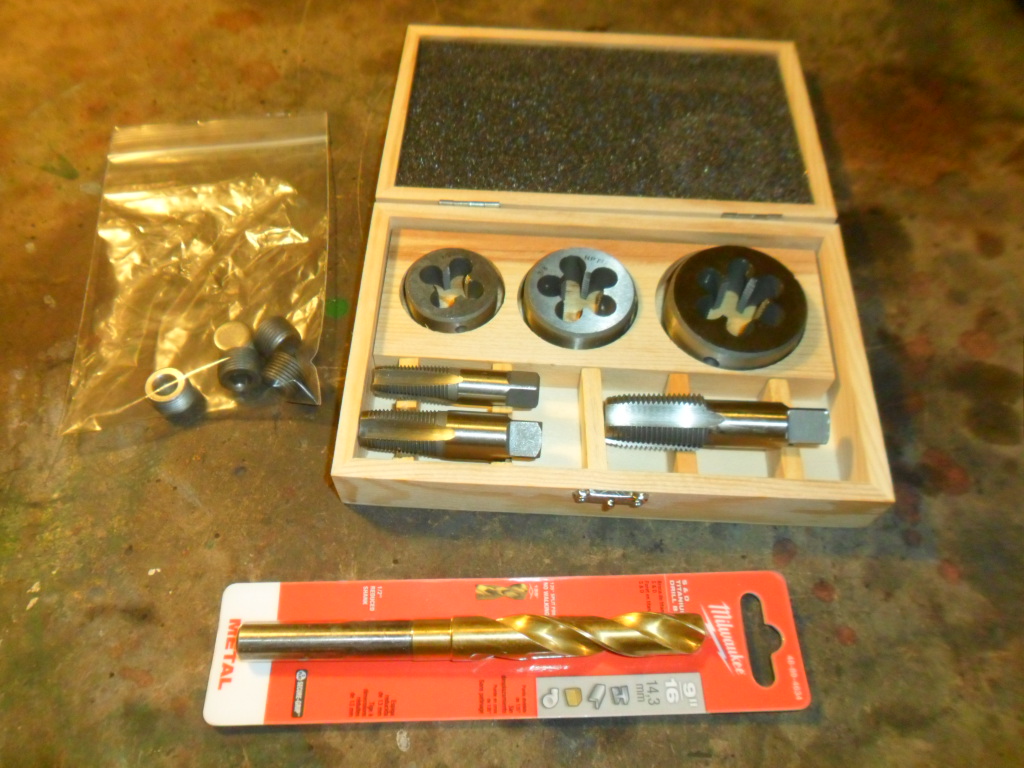
I figured out afterward that there is a kit available for slightly less money than I have invested in this task. ![]() Here it is in case anyone else is looking:
Here it is in case anyone else is looking:
http://www.germansupply.com/home/customer/product.php?productid=16842
Posted by: rdauenhauer Feb 2 2016, 10:10 PM
are those steel or Alum. plugs?
Posted by: saigon71 Feb 3 2016, 08:10 AM
are those steel or Alum. plugs?
Steel.
Posted by: Olympic 1.7 Feb 3 2016, 08:30 AM
When I did mine I got an extra tap and ground the bottom of it to use as a bottoming tap. I started the threads with the regular tap, then ran the bottoming tap in.
That way I was able to thread the plugs in without having to drill deeper. 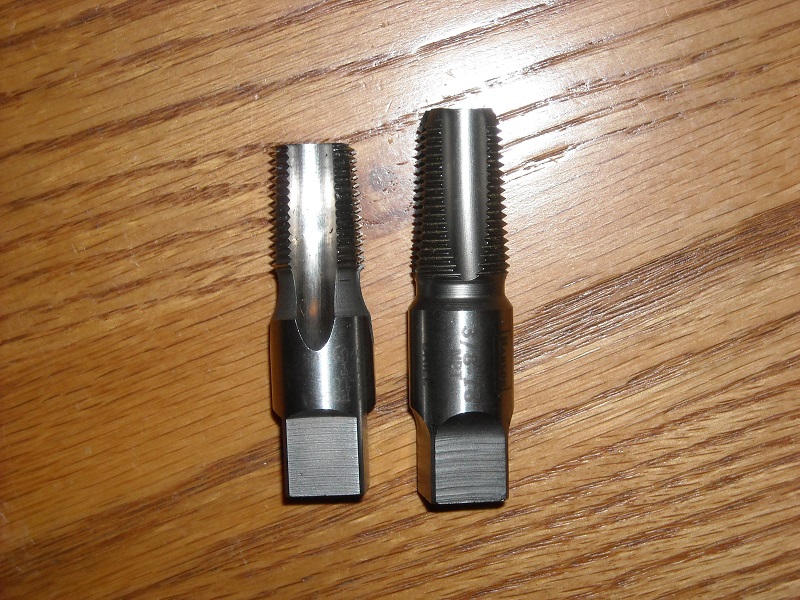
Posted by: McMark Feb 3 2016, 08:35 AM
![]() A second tap is handy.
A second tap is handy.
Also, when drilling the aluminum DON'T PUSH the drill. Pressure will make the bit grab and will spin the drill. Best is to use a drill that has a clutch on it, for safety. If your drill doesn't have a clutch, be ready to completely let go of it if the bit catches. But if you keep very very very very very light pressure on the bit, you will minimize the bit-catches.
Posted by: Mark Henry Feb 3 2016, 10:20 AM
Also, when drilling the aluminum DON'T PUSH the drill. Pressure will make the bit grab and will spin the drill. Best is to use a drill that has a clutch on it, for safety. If your drill doesn't have a clutch, be ready to completely let go of it if the bit catches. But if you keep very very very very very light pressure on the bit, you will minimize the bit-catches.
Keep spraying it with WD-40 and it doesn't catch as much and no build-up on the tool.
Is there better lube?
Likely, but everyone has a can of WD-40 kicking around.
Posted by: McMark Feb 3 2016, 12:58 PM
Oh yeah. That for sure! ![]()
Posted by: nathansnathan Feb 3 2016, 05:14 PM
When I did this the 1st time, I had got some 3/8" NPT plugs from mcmaster-carr and they were way thicker (would have to be run deeper) than the ones I ended up using which I got from rimco. I don't think they would have worked for the outer one by the oil cooler.
I was able to use 1 tap and just ground it down alternately to running it, like it became a bottoming tap by the time I was done. You just need it for that one by the oil cooler.
wd-40 is relatively bad as a lubricant. I think it's pretty bad for everything actually and refuse to buy such a crappy consumer-ish product. ![]() For such an important job I would use actual oil and go for class A threads.
For such an important job I would use actual oil and go for class A threads.
I used loctite 518 to seal them, as it sets anaerobically.
Posted by: Mark Henry Feb 3 2016, 08:38 PM
When I did this the 1st time, I had got some 3/8" NPT plugs from mcmaster-carr and they were way thicker (would have to be run deeper) than the ones I ended up using which I got from rimco. I don't think they would have worked for the outer one by the oil cooler.
I was able to use 1 tap and just ground it down alternately to running it, like it became a bottoming tap by the time I was done. You just need it for that one by the oil cooler.
wd-40 is relatively bad as a lubricant. I think it's pretty bad for everything actually and refuse to buy such a crappy consumer-ish product.
I used loctite 518 to seal them, as it sets anaerobically.
Meh.... guess I've been doing it wrong since the early 90's, oh well just a few hundred or more type one full flow and T4 cases.
The plugs by the cooler can sit proud, they won't interfere with anything.
BTW if you are going with a full flow system you only really have to do the one top hole.
Posted by: McMark Feb 3 2016, 09:50 PM
Wd-40 is better than goo-gone for removing stick residue. ![]()
Posted by: nathansnathan Feb 4 2016, 12:03 AM
When I did this the 1st time, I had got some 3/8" NPT plugs from mcmaster-carr and they were way thicker (would have to be run deeper) than the ones I ended up using which I got from rimco. I don't think they would have worked for the outer one by the oil cooler.
I was able to use 1 tap and just ground it down alternately to running it, like it became a bottoming tap by the time I was done. You just need it for that one by the oil cooler.
wd-40 is relatively bad as a lubricant. I think it's pretty bad for everything actually and refuse to buy such a crappy consumer-ish product.
I used loctite 518 to seal them, as it sets anaerobically.
Meh.... guess I've been doing it wrong since the early 90's, oh well just a few hundred or more type one full flow and T4 cases.
The plugs by the cooler can sit proud, they won't interfere with anything.
BTW if you are going with a full flow system you only really have to do the one top hole.
Meh.... guess working as a machinist I wouldn't know about threading aluminum.'
WD40 is mostly mineral oil and wax. Aluminum has a tendency to gall and to break taps. Make it easy on yourself, and the threads will be better.
To get class A threads will require that you tap a minimum amount, meaning letting it sit proud.. it isn't really up to you in this situation. I was simply stating that is something to look out for.
You made me put you back on my ignore list. Not sure how you ever got removed.
Posted by: nine9three Feb 4 2016, 12:11 AM
I've always used JB Weld to seal mine. Never had a leak ![]()
Posted by: Mark Henry Feb 4 2016, 07:38 AM
When I did this the 1st time, I had got some 3/8" NPT plugs from mcmaster-carr and they were way thicker (would have to be run deeper) than the ones I ended up using which I got from rimco. I don't think they would have worked for the outer one by the oil cooler.
I was able to use 1 tap and just ground it down alternately to running it, like it became a bottoming tap by the time I was done. You just need it for that one by the oil cooler.
wd-40 is relatively bad as a lubricant. I think it's pretty bad for everything actually and refuse to buy such a crappy consumer-ish product.
I used loctite 518 to seal them, as it sets anaerobically.
Meh.... guess I've been doing it wrong since the early 90's, oh well just a few hundred or more type one full flow and T4 cases.
The plugs by the cooler can sit proud, they won't interfere with anything.
BTW if you are going with a full flow system you only really have to do the one top hole.
Meh.... guess working as a machinist I wouldn't know about threading aluminum.'
WD40 is mostly mineral oil and wax. Aluminum has a tendency to gall and to break taps. Make it easy on yourself, and the threads will be better.
To get class A threads will require that you tap a minimum amount, meaning letting it sit proud.. it isn't really up to you in this situation. I was simply stating that is something to look out for.
You made me put you back on my ignore list. Not sure how you ever got removed.
Boo Hoo....ignore list are made for girls with no spine. Whatever
Posted by: Puebloswatcop Feb 4 2016, 08:31 AM
WD40 does a fair job, but if you want really clean threads you really should use cutting oil that is specifically made for the job. I have tried both and there is a huge difference. It is available at hardware stores and harbor freight.
Posted by: McMark Feb 4 2016, 09:04 AM
I love how these threads go awry. ![]()
Is cutting oil better for the job? Absolutely.
Will WD-40 work? Absolutely.
Should he go out and get special cutting oil to do this job? Absolutely not.
I'll send him a free, machined engine case if using WD-40 causes a problem.
And I'm putting all of you on my ignore list! ![]()
Posted by: pilothyer Feb 4 2016, 09:20 AM
You can spend the money on special for aluminum "Tap Magic" or you can simply use...........get ready.................olive oil.....it really does work well.
Posted by: 914_teener Feb 4 2016, 09:35 AM
I love how these threads go awry.
Is cutting oil better for the job? Absolutely.
Will WD-40 work? Absolutely.
Should he go out and get special cutting oil to do this job? Absolutely not.
I'll send him a free, machined engine case if using WD-40 causes a problem.
And I'm putting all of you on my ignore list!
No.....don.t do that!
Love the avatar!
Posted by: McMark Feb 4 2016, 09:40 AM
Had to. This got way too dramatic over WD-40. ![]()

Posted by: Mark Henry Feb 4 2016, 10:20 AM
Had to. This got way too dramatic over WD-40.

I know...like wow....I even said it might not be the best.
One thing that gets me is is someone say there is only one way, my way and then tell you the expensive way to do things.
My "right way" is often the cheapest way to do a good job. It's never the only way or the only right way.
So to put the money where my mouth is....
The number 1 cylinder flywheel side is the only plug you should worry about getting flush as it will hit the flywheel. Best is to cut a thread, check with a plug and repeat till you the plug is flush to the case.
Attached image(s)
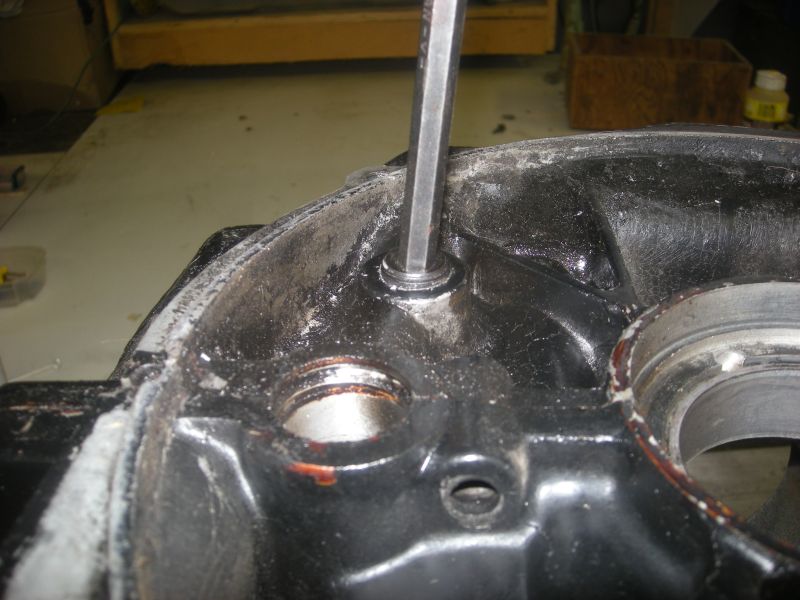
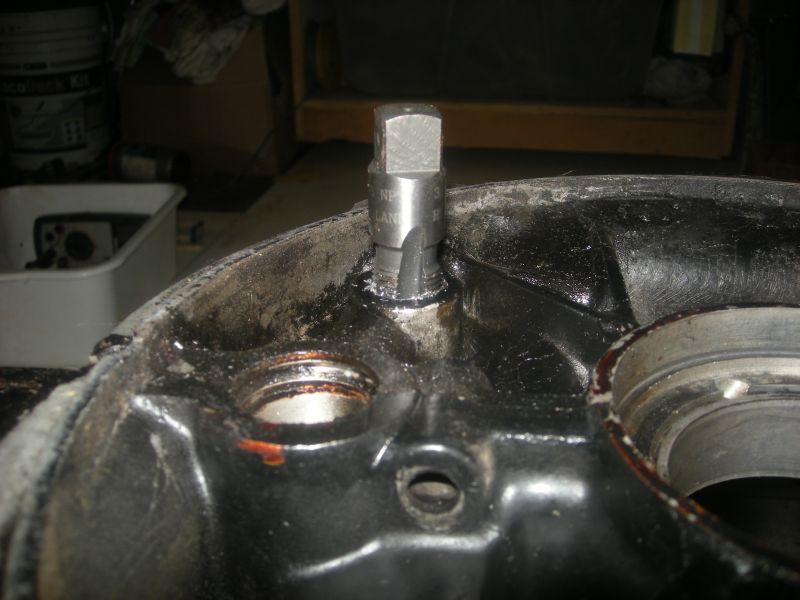
Posted by: Mark Henry Feb 4 2016, 10:23 AM
Now I have it pretty well flush, BTW I'll be doing this all with one tap only
Attached image(s)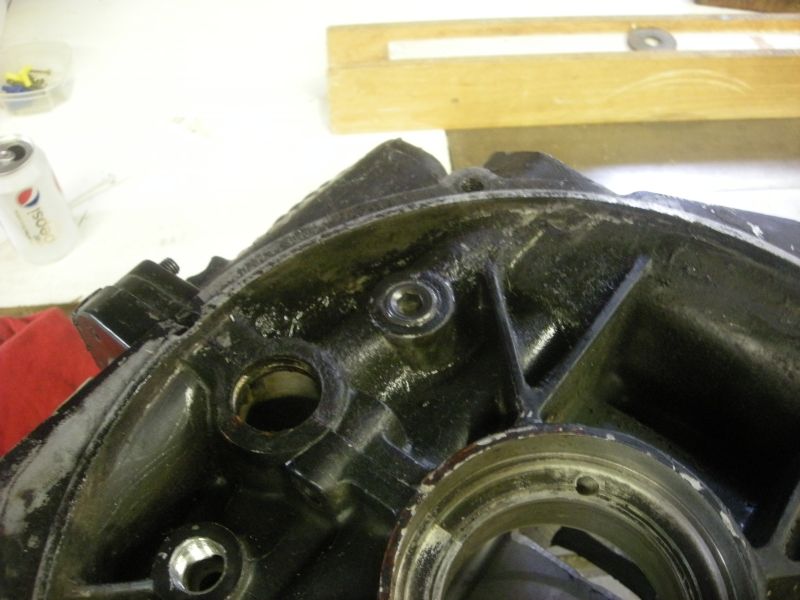
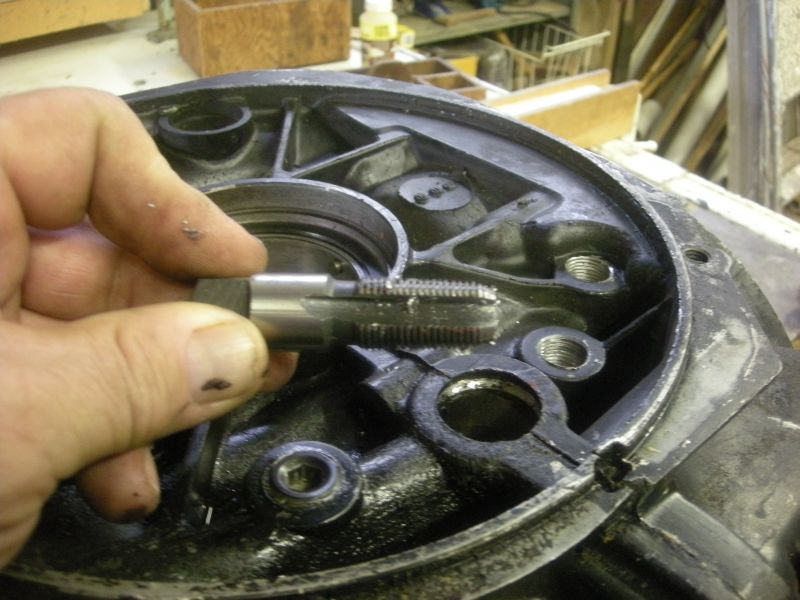
Posted by: Mark Henry Feb 4 2016, 10:31 AM
This came out good ![]()
This show the one plug you have to be careful of as you don't want to plug the cam galley. That said as long as you don't go beyond flush you're OK as a 3/8 plug is about 1/2" deep and you have 1/2" of material. Except for the #1 plug you can leave all the rest of the plugs a bit proud.
Also it does cut threads into the galley hole, who cares, get over it because it doesn't matter. If it really bugs you that much smooth it out with a dremel.
Attached image(s)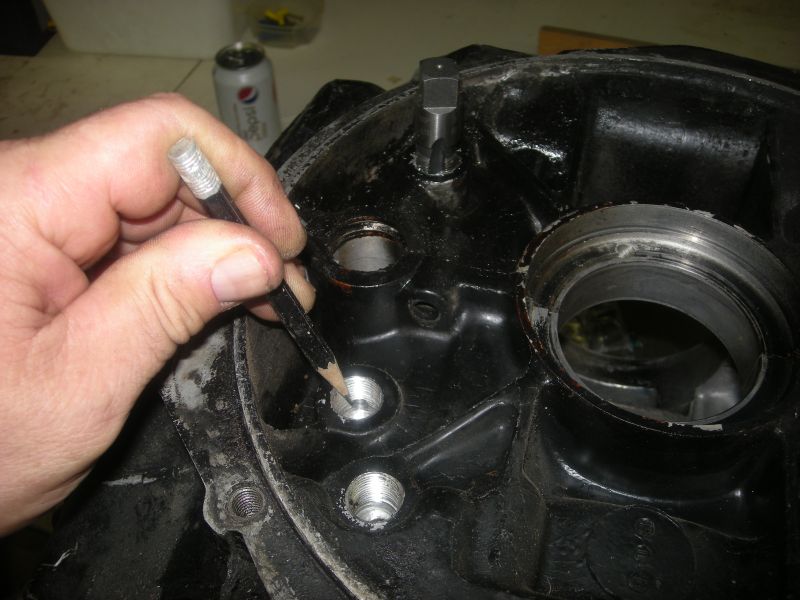
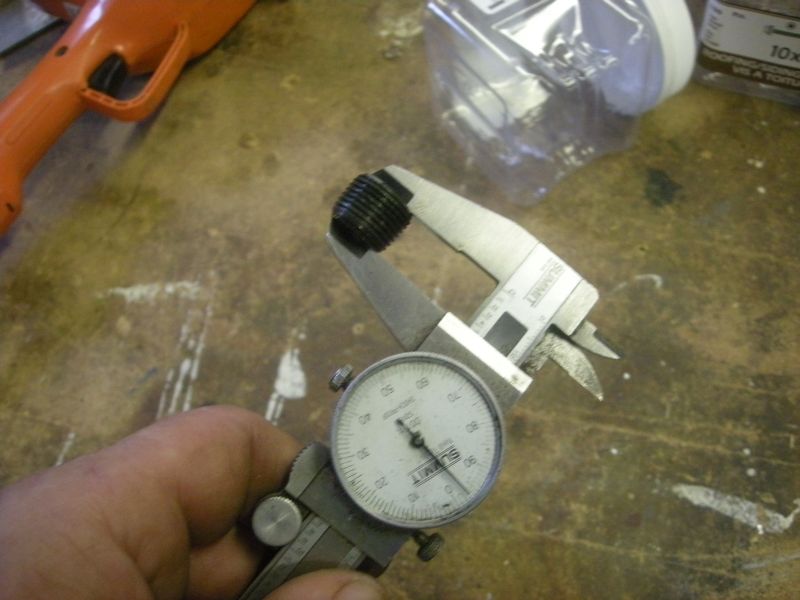
Posted by: Mark Henry Feb 4 2016, 10:43 AM
The last pic shows 3 different steel plugs.
The one on the left is like the short rimco one mentioned by someone else. I don't like this one because it has a slot instead of a hex. The other issues I have is they are not a common plug and IMHO not needed.
The middle pic is a brass and like aluminum the hex strips out way too easy.
Sealants, the only big no-no is teflon tape, it's so slippy you can easily over torque the plug and in worst case crack the boss. Most other sealants will work just don't get it in the case.
The center plug below has a sealant pre applied. They have never leaked on me but, to be honest I do put a drop of loctite on them.
Also note the plug is sitting about 1/8" proud in the first pic, this is OK.
Attached image(s)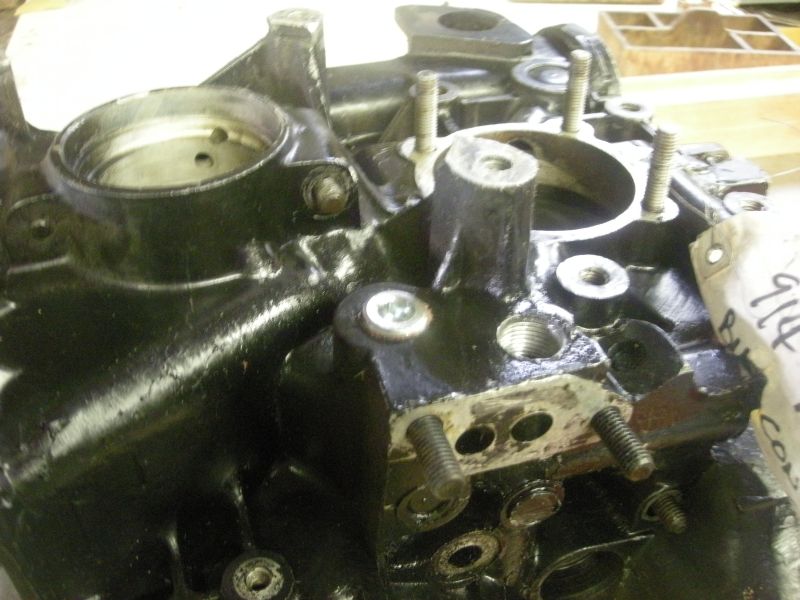
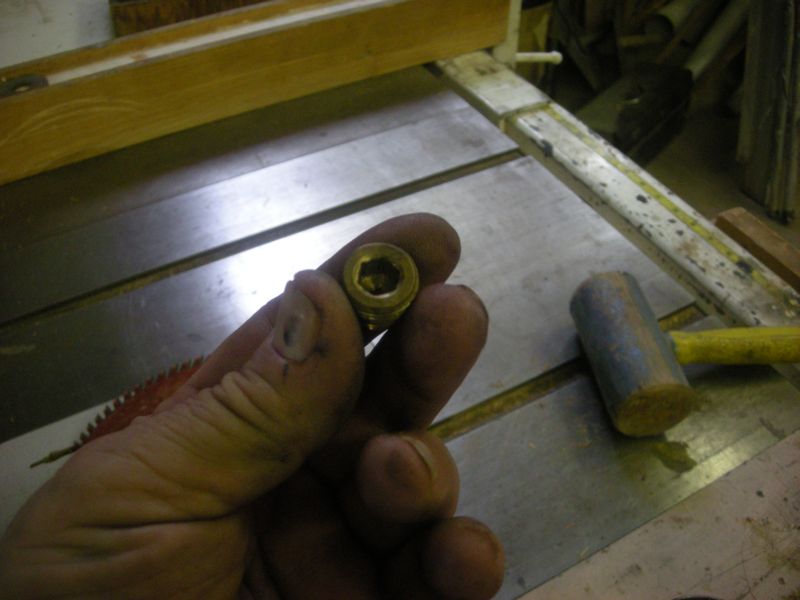
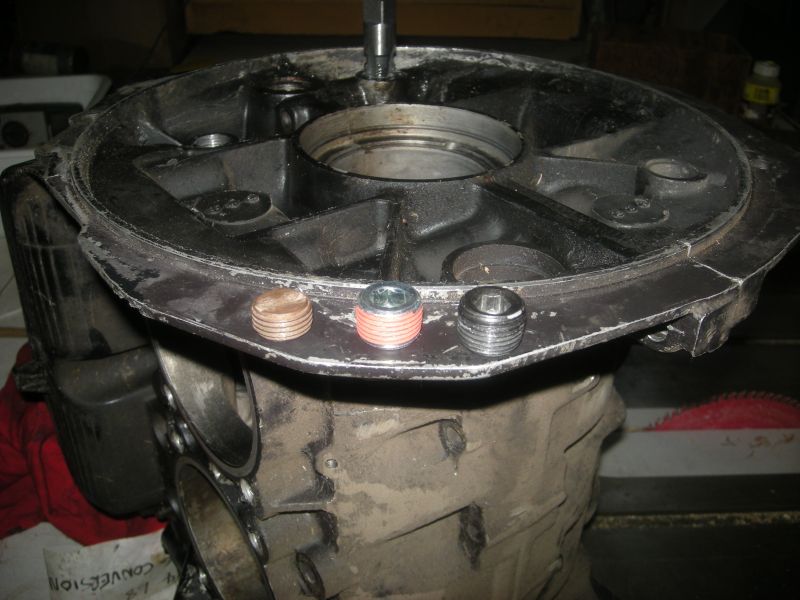
Posted by: Mark Henry Feb 4 2016, 10:59 AM
You can spend the money on special for aluminum "Tap Magic" or you can simply use...........get ready.................olive oil.....it really does work well.
Prefect, next time I throw a chunk of aluminum on the lathe I'll give that a try.
This is what I'm talking about, using something on hand instead of going out and spending money on something you will only use once.
Posted by: saigon71 Mar 13 2016, 05:13 PM
Thanks for all the technical support on this...especially Mark for posting the tutorial with pictures! ![]()
The five suspect galley plugs were all tight on my engine & it took some force to pull them out with a slide hammer. Regardless, I'm glad I took this precaution.
Installed the five galley plugs today with Locktite 565, following Mark's guidelines for depth.
Used PB Blaster for lube. ![]()
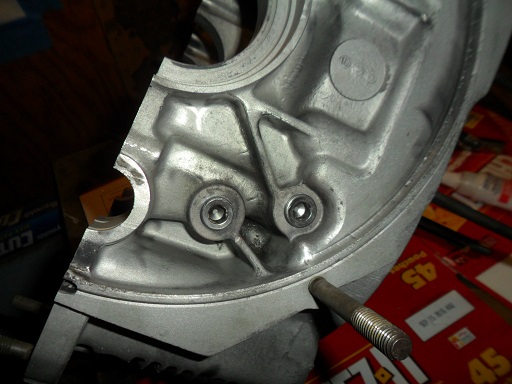
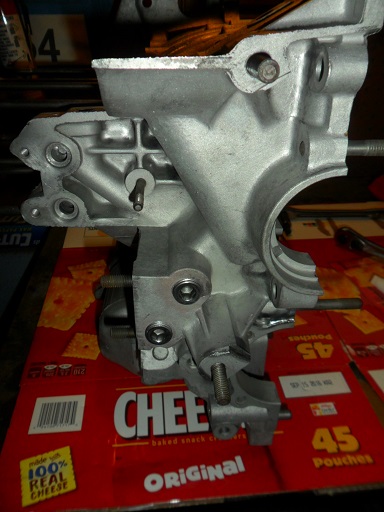
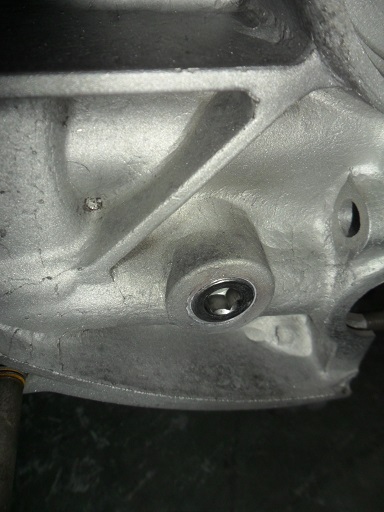
Posted by: Mark Henry Mar 13 2016, 08:42 PM
![]()
Good job!
Powered by Invision Power Board (http://www.invisionboard.com)
© Invision Power Services (http://www.invisionpower.com)
